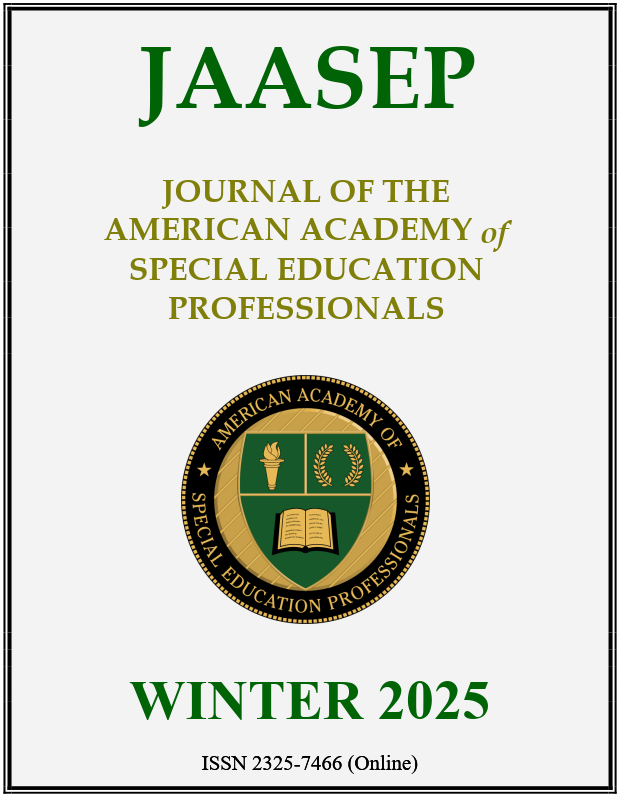Resilience and Stressors: Examining Impact of COVID-19 on Rural Special Education Teachers
Averett, K. H. (2021). Remote learning, COVID-19, and children with disabilities. AERA Open, 7. https://doi.org/10.1177/23328584211058471 DOI: https://doi.org/10.1177/23328584211058471
Berry. (2012). The relationship of perceived support to satisfaction and commitment for Special Education teachers in rural areas. Rural Special Education Quarterly, 31(1), 3–14. https://doi.org/10.1177/875687051203100102 DOI: https://doi.org/10.1177/875687051203100102
Billingsley, & Bettini, E. (2019). Special education teacher attrition and retention: A review of the literature. Review of Educational Research, 89(5), 697–744. https://doi.org/10.3102/0034654319862495 DOI: https://doi.org/10.3102/0034654319862495
Braun, V., & Clarke, V. (2006). Using thematic analysis in psychology. Qualitative Research in Psychology, 3(2), 77–101. https://doi.org/10.1191/1478088706qp063oa DOI: https://doi.org/10.1191/1478088706qp063oa
Darling-Hammond, L., Schachner, A., & Edgerton, A. (2020). Restarting and reinventing school: Learning in the time of COVID and beyond. Learning Policy Institute. Retrieved in June 2023 from https://learningpolicyinstitute.org/product/restarting-reinventing-school-covid-report
Ducy, E. M., & Stough, L. M. (2021). Educational experiences of children and youth with disabilities impacted by wildfires. Disaster Prevention and Management, 30(3), 279-292. https://doi.org/10.1108/DPM-10-2020-0310 DOI: https://doi.org/10.1108/DPM-10-2020-0310
Fitzpatrick. (2022). The Impact of the COVID-19 Pandemic on Special Educators’ Perceived Levels of Burnout. ProQuest Dissertations Publishing.
Garwood, Werts, M. G., Varghese, C., & Gosey, L. (2018). Mixed-methods analysis of rural special educators’ role stressors, behavior management, and burnout. Rural Special Education Quarterly, 37(1), 30–43. https://doi.org/10.1177/8756870517745270 DOI: https://doi.org/10.1177/8756870517745270
Gross, B., and A. Opalka. (2020). Too many schools leave learning to chance during the Pandemic."" Center on Reinventing Public Education. Retrieved June 2023, from https://www.crpe.org/thelens/too-many-schools-leave-learning-chance-during-pandemic.
Haines, Strolin-Goltzman, J., Ura, S. K., Conforti, A., & Manga, A. (2022). It flows both ways: Relationships between families and educators during the COVID-19 pandemic. Education Sciences, 12(11), 745–. https://doi.org/10.3390/educsci12110745 DOI: https://doi.org/10.3390/educsci12110745
Hawley, Koziol, N. A., Bovaird, J. A., McCormick, C. M., Welch, G. W., Arthur, A. M., & Bash, K. (2016). Defining and describing rural: Implications for rural special education research and policy. Rural Special Education Quarterly, 35(3), 3–11. https://doi.org/10.1177/875687051603500302 DOI: https://doi.org/10.1177/875687051603500302
Jameson, J. M., Stegenga, S. M., Ryan, J., & Green, A. (2020). Free Appropriate Public Education in the time of COVID-19. Rural Special Education Quarterly, 39(4), 181–192. https://doi.org/10.1177/8756870520959659 DOI: https://doi.org/10.1177/8756870520959659
Konstantopoulou, G., Dimitra, V., Papakala, I., Styliani, R., Vasiliki, T., Ioakeimidi, M., ... & Iliou, T. (2022). The mental resilience of employees in special education during the pandemic Covid-19. Advances in Mobile Learning Educational Research, 2(1), 246-250. https://doi.org/10.25082/AMLER.2022.01.008 DOI: https://doi.org/10.25082/AMLER.2022.01.008
Koziol, N. A., Arthur, A. M., Hawley, L. R., Bovaird, J. A., Bash, K. L., McCormick, C., & Welch, G. W. (2015). Identifying, analyzing and communicating rural: A quantitative perspective. Journal of Research in Rural Education, 30(4), 1-14. Retrieved June 2023 from https://unk.idm.oclc.org/login?url=https://www.proquest.com/scholarly-journals/identifying-analyzing-communicating-rural/docview/1667167271/se-2
Mason-Williams, Bettini, E., Peyton, D., Harvey, A., Rosenberg, M., & Sindelar, P. T. (2020). Rethinking shortages in special education: Making good on the promise of an equal opportunity for students with disabilities. Teacher Education and Special Education, 43(1), 45–62. https://doi.org/10.1177/0888406419880352 DOI: https://doi.org/10.1177/0888406419880352
Nebraska Rural Community Schools Association. (2022). https://www.nrcsa.net/. Accessed June 2023.
Park, & Shin, M. (2020). A meta-analysis of special education teachers’ burnout. SAGE Open, 10(2), 215824402091829–. https://doi.org/10.1177/2158244020918297 DOI: https://doi.org/10.1177/2158244020918297
Ratliff, K. (2019). Building rapport and creating a sense of community: Are relationships important in the online classroom? Internet Learning, 7(1). https://doi.org/10.18278/il.7.1.4 DOI: https://doi.org/10.18278/il.7.1.4
Sindelar, N., Pua, D. J., Fisher, T., Peyton, D. J., Brownell, M. T., & Mason-Williams, L. (2018). The demand for special education teachers in rural schools revisited: An update on progress. Rural Special Education Quarterly, 37(1), 12–20. https://doi.org/10.1177/8756870517749247 DOI: https://doi.org/10.1177/8756870517749247
Singh, S., Roy, D., Sinha, K., Parveen, S., Sharma, G., & Joshi, G. (2020). Impact of COVID-19 and lockdown on mental health of children and adolescents: A narrative review with recommendations. Psychiatry Research, 293, 113429-113429. https://doi.org/10.1016/j.psychres.2020.113429 DOI: https://doi.org/10.1016/j.psychres.2020.113429
United States Census Bureau. (2017). What Is Rural America? Retrieved May 2023 from https://www.census.gov/library/stories/2017/08/rural-america.html
U.S. Department of Education (2017). Report on rural education. Retrieved June 2023 from https://www2.ed.gov/about/inits/ed/rural/rural-education-report.pdf
Vivek, R., & Nanthagopan, Y. (2021). Review and comparison of multi-method and mixed method application in research studies. European Journal of Management Issues, 29(4), 200-208. https://doi.org/10.15421/192119 DOI: https://doi.org/10.15421/192119
Will, M. 2020. ""Teachers at higher risk of COVID-19 wonder: Should I even go back?"" Education Week. https://www-edweek-org.unk.idm.oclc.org/leadership/teachers-at-higher-risk-of-covid-19-wonder-should-i-even-go-back/2020/05.
Witte, A.L., Prokasky, A., Boise, C., Gomes, R. T. M., Nugent, G. C., & Sheridan, S. M. (2023). Concern, conflict, and chaos: Nebraska educator experiences during the pandemic. Great Plains Research, 33(1), 47–57. https://doi.org/10.1353/gpr.2023.0004 DOI: https://doi.org/10.1353/gpr.2023.0004
Downloads
Article Information
- Article Type Articles
- Submitted January 12, 2025
- Published February 15, 2025
- Issue Winter 2025
- Section Articles
